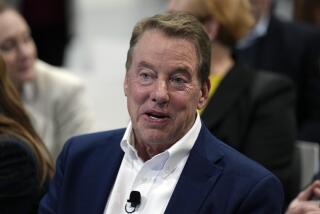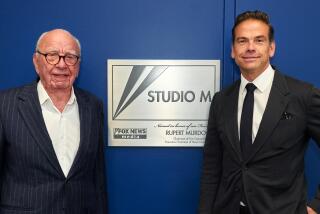What’s In Store for Ford? : Professional Managers Could Still Be Replaced by One of the Heirs
- Share via
DETROIT — The last Ford to have run Ford Motor Co. is now dead. Today, the world’s second-largest auto company, once passed down the generations like a Ford family heirloom, is in the hands of a cadre of professional managers with no familial or historical ties to the legendary Henry Ford I.
Ford Chairman Donald E. Petersen, 60, who succeeded Philip Caldwell as chairman in 1985, is widely hailed as the architect of Ford Motor’s recovery in the mid-1980s and is firmly in control. And, clearly, the current team of professional managers at Ford is likely to remain solidly in place for the foreseeable future.
Yet, the death Tuesday of Henry Ford II, Henry Ford’s grandson, is unlikely to end the Ford family’s ultimate control over Ford Motor Co., which they have quietly maintained through their monopoly of a controlling class of Ford stock ever since Henry II retired as chairman in 1980.
Ironfisted Control
Despite seven years of outside management, the Ford family still hasn’t made it clear whether it ever really plans to give up its right to name one of its own to run the company in the future.
Since they still hold 40% of the voting power of all Ford stock, along with a special veto power over any merger or possible takeover granted to their family stock, they still have the power to shape Ford Motor’s future if they choose to use it.
And, after all, Henry Ford III, now a 7-year-old grade schooler in Grosse Pointe, Mich., and son of Edsel II, is growing up fast.
“Ford is a company that is still in the process of making up its mind over whether it is family-run or management-run,” said David Cole, director of the Center for the Study of Automotive Transportation at the University of Michigan.
“As long as the family owns that much stock, there has got to be a Ford in there somewhere,” added David Smith, editor-in-chief of Ward’s Auto World, an industry trade publication. “I’m sure they will still want to have a voice.”
The Ford family’s ultimate control of the company seems to be ironfisted at least through the year 2000. But the terms of their special stock may contain the seeds of its eventual dilution and suggest that the Fords may not control Ford forever.
Certainly the death of Henry II, Ford’s chairman for 35 years, will, in the short run, drastically reduce the family’s top-level influence at Ford Motor. No one else in the family can match the wealth of experience that Henry had gained, first as the handpicked protege of his grandfather, and later as the man responsible for transforming a nearly wrecked company into one of the postwar world’s most powerful multinational corporations.
And, although he retired as chairman in 1980, Henry had remained deeply involved in Ford Motor affairs until his recent illness. He was still an active member of Ford’s board and continued as chairman of the board’s powerful finance committee until his death. Industry observers believe that, while he had turned over daily control to his managers, he was still involved in major policy decisions; most important, he probably retained veto power over the naming of new chairmen and presidents.
Henry II was the only Ford of his generation to ever exert real authority at Ford, and as a result the family may suffer a temporary void in its influence inside the firm. Henry’s younger brother, William Clay Ford, is still vice chairman of Ford, and actually owns much more Ford stock than did Henry. But he has rarely been deeply involved in the company’s business; the most notable exception was when he briefly sided with former Ford President Lee A. Iacocca during his celebrated feud with Henry.
New Ford Generation
In fact, William Clay Ford has been ambiguous over the years in his assessment of the prospects for the younger members of the Ford family at Ford. “Any of the younger generations named Ford are going to get a little closer scrutiny than somebody else would,” he said in 1979. “On the other hand, it’s such a big company, and there are so many important jobs in it that I can’t see them scrapping and scraping for an awful long time to come. . . . They don’t all have to become chairman of the board and they don’t all have to become president.”
Indeed, a new Ford generation is now emerging at Ford Motor, and it is still uncertain how high their family expects them to rise within the corporate ranks.
Henry II’s only son, Edsel B. Ford II, 38, is the highest ranking of any of the younger Fords. After moving rapidly through the marketing ranks at Ford, he is the general sales manager of the Lincoln-Mercury division--making him the top salesman at one of the company’s two main passenger-car divisions.
But William Clay Ford Jr., the 30-year-old son of William Clay Ford, may be more ambitious than his cousin and is certainly moving up at an even faster pace. Widely considered to be the brightest of the younger Fords, William Clay Jr. was named chairman and managing director of Ford of Switzerland earlier this month, after having served briefly as director of truck marketing for Ford of Europe.
The Ford family is unlikely to pressure management into turning over control of the company to either Edsel or William Clay Jr. if they don’t prove themselves the equals of outside managers.
Harold A. Poling, the 61-year-old president of Ford, is unlikely to succeed Petersen, who is 60. But other top managers, including Allan D. Gilmour, 52, the firm’s executive vice president and chief financial officer, seem to be in line to become the third consecutive non-family member chairman of Ford Motor.
“I don’t think the family or the board are necessarily predisposed to having a family member running the company--unless somebody gets there on merit,” Cole noted. “And it’s a big step to go from where Edsel and Bill Jr. are now to running the company.”
But the fact both are on the fast track inside the corporation has led to growing speculation that one of them may eventually move to the top at Ford’s Glass House headquarters in Dearborn, Mich. “I think both will get cracks at top jobs--it just depends on how high you want to talk about,” Smith added.
While there are four Fords in their 30s and 40s working at Ford Motor now, Edsel and William Clay Jr. are the only family members with real prospects of moving into powerful posts.
The most notable example is Benson Ford Jr., the once rebellious son of Benson Ford, Henry II’s late brother. In the late 1970s, Benson Jr., 38, mounted a highly publicized and futile challenge to Henry II’s control of Ford, while also seeking to overturn his own father’s will in order to gain access to a multimillion-dollar trust fund.
Meanwhile, he was living in the Los Angeles area, came under the sway of a California therapist, Louis Fuentes, allegedly lost millions of dollars in failed business ventures with Fuentes and eventually became a family outcast.
Yet last year, after repenting his past transgressions against the family and moving home to Detroit, Benson was quietly given a job as a parts and service trainee at Ford. He was then quickly named the Detroit district zone manager for the company’s parts and service division last March, despite having less than one year’s worth of experience with the company.
Staff Writer Donald Woutat contributed to this report.






